Handling Greek words can be dependent on your platform.
First of all, you need to understand how file handling works. Here is what I wrote:
#include <stdio.h>
#include <string.h>
#include <ctype.h>
#define bufSize 1024 // max lenght of word
// we are going to receive the .txt from cmd line
int main(int argc, char *argv[])
{
FILE *fp;
// Assume file has max 10 words
const size_t N = 10;
// Allocate a 2D array of N rows
// and bufSize columns.
// You can think of it like an array
// of N strings, where every string
// has, at most, bufSize length.
char buf[N][bufSize];
// make sure we got the .txt
if (argc != 2)
{
fprintf(stderr,
"Usage: %s <soure-file>\n", argv[0]);
return 1;
}
// open the file
if ((fp = fopen(argv[1], "r")) == NULL)
{ /* Open source file. */
perror("fopen source-file");
return 1;
}
// we will use that for toupper()
char c;
// counters
int i = 0, j;
while (fscanf(fp, "%1024s", buf[i]) == 1)
{ /* While we don't reach the end of source. */
/* Read characters from source file to fill buffer. */
// print what we read
printf("%s\n", buf[i]);
j = 0;
// while we are on a letter of word placed
// in buf[i]
while (buf[i][j])
{
// make the letter capital and print it
c = buf[i][j];
putchar (toupper(c));
j++;
}
i++;
printf("\ndone with this word\n");
}
// close the file
fclose(fp);
return 0;
}
For this test.txt file:
Georgios
Samaras
Γιώργος
Σαμαράς
the code would run as:
./exe test.txt
Georgios
GEORGIOS
done with this word
Samaras
SAMARAS
done with this word
Γιώργος
Γιώργος
done with this word
Σαμαράς
Σαμαράς
done with this word
As you can see, I could read the Greek words, but failed to convert them in upper case ones.
Once you got how file handling goes, you need to use wide characters to read a file with Greek words.
So, by just modifying the above code, we get:
#include <stdio.h>
#include <string.h>
#include <ctype.h>
#include <wchar.h>
#include <wctype.h>
#include <locale.h>
#define bufSize 1024
int main(int argc, char *argv[])
{
setlocale(LC_CTYPE, "en_GB.UTF-8");
FILE *fp;
const size_t N = 15;
wchar_t buf[N][bufSize];
if (argc != 2)
{
fprintf(stderr,
"Usage: %s <soure-file>\n", argv[0]);
return 1;
}
if ((fp = fopen(argv[1], "r")) == NULL)
{
perror("fopen source-file");
return 1;
}
wchar_t c;
int i = 0, j;
while (fwscanf(fp, L"%ls", buf[i]) == 1)
{
wprintf( L"%ls\n\n", buf[i]);
j = 0;
while (buf[i][j])
{
c = buf[i][j];
putwchar (towupper(c));
j++;
}
i++;
wprintf(L"\ndone with this word\n");
}
fclose(fp);
return 0;
}
And now the output is this:
Georgios
GEORGIOS
done with this word
Samaras
SAMARAS
done with this word
Γιώργος
ΓΙΏΡΓΟΣ
done with this word
Σαμαράς
ΣΑΜΑΡΆΣ
done with this word
I see that you may want to create a function which reads the words. If you need a simple example of functions in C, you can visit my pseudo-site here.
As for the 2D array I mentioned above, this picture might help:

where N is the number of rows (equal to 4) and M is the number of columns (equal to 5). In the code above, N is N and M is bufSize. I explain more here, were you can also found code for dynamic allocation of a 2D array.
I know see that you are on Windows. I tested the code in Ubuntu.
For Windows you might want to take a good look at this question.
So, after you read all the above and understand them, you can see what you asked for with dynamic memory management.
#include <stdio.h>
#include <string.h>
#include <stdlib.h>
#include <wchar.h>
#include <wctype.h>
#include <locale.h>
#define bufSize 1024
wchar_t **get(int N, int M);
void free2Darray(wchar_t** p, int N);
int main(int argc, char *argv[])
{
setlocale(LC_CTYPE, "en_GB.UTF-8");
FILE *fp;
const size_t N = 15;
wchar_t** buf = get(N, bufSize);
if (argc != 2)
{
fprintf(stderr,
"Usage: %s <soure-file>\n", argv[0]);
return 1;
}
if ((fp = fopen(argv[1], "r")) == NULL)
{
perror("fopen source-file");
return 1;
}
wchar_t c;
int i = 0, j;
while (fwscanf(fp, L"%ls", buf[i]) == 1)
{
wprintf( L"%ls\n", buf[i]);
j = 0;
while (buf[i][j])
{
c = buf[i][j];
putwchar (towupper(c));
j++;
}
i++;
wprintf(L"\ndone with this word\n");
}
fclose(fp);
// NEVER FORGET, FREE THE DYNAMIC MEMORY
free2Darray(buf, N);
return 0;
}
// We return the pointer
wchar_t **get(int N, int M) /* Allocate the array */
{
/* Check if allocation succeeded. (check for NULL pointer) */
int i;
wchar_t **table;
table = malloc(N*sizeof(wchar_t *));
for(i = 0 ; i < N ; i++)
table[i] = malloc( M*sizeof(wchar_t) );
return table;
}
void free2Darray(wchar_t** p, int N)
{
int i;
for(i = 0 ; i < N ; i++)
free(p[i]);
free(p);
}
Note that this code is expected to work on Linux (tested on Ubuntu 12.04), not on Windows (tested on Win 7).
